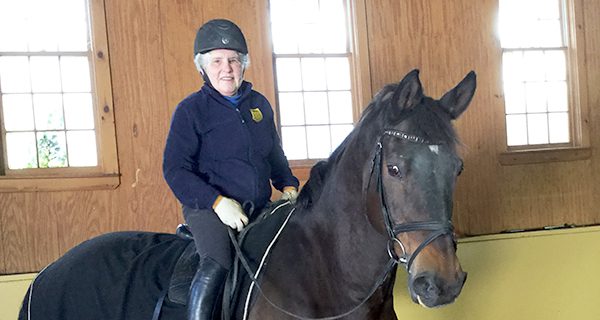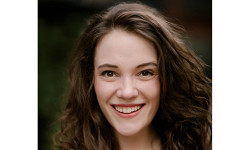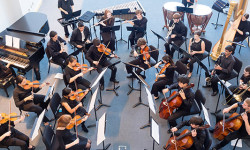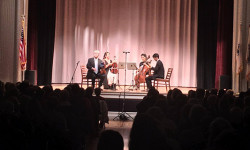By Linda Thomas
Hometown Weekly Correspondent
Liz Hunter was warming up for the second dressage show that rainy day in June 2015 when suddenly an energetic volunteer dumped 50 pounds of ice into an empty cooler.
The roaring noise startled Mozart, the Westphalian she rides from Sage Farm in Dover.
“He jumped sideways and put in a little extra step,” recalls the 71-year-old Walpole woman. “I was tense and went off over his right shoulder and landed on the ground.”
Hunter got right back on and just assumed she was going to have a world-class bruise. But she had broken her sacrum, which is above the tailbone and part of the pelvis.
“I didn’t even realize I had a sacrum,” she chuckled. “It hurt like hell, and I wasn’t comfortable, so we decided I’d withdraw from the show.”
Hunter was planning on taking an Eastern European trip later that year. But her doctors warned her against riding because if she fell again and broke something, they wouldn’t allow her to go on the trip.
After a month, she was back on the treadmill but didn’t ride until she got back from her trip three months later. It took at least six months of painful rehab to get her core strength back.
Hunter has been riding since she was 5, including fox-hunting with the Norfolk Hunt. At barely 5 feet 3, she usually needs assistance to help mount her onto her 1,200 pound horse, Mozart, who stands over 6 feet tall at the shoulder.
That day in 2015 was the first time in 65 years she’d fallen and broken something.
Calling the accident an anomaly, she told herself, “I’m just not going to fall off Mozart again.”
This is how Hunter has lived her life — with intensity, determination and a fierceness of spirit.
Brian Russell, who owns Sage Farm and teaches Hunter, describes her as “aggressive.”
“She doesn’t let anything stop her,” he said of his student, who came to the Dover farm two years ago. “Whether she has a flu or a broken sacrum, she shows up three times a week here — on schedule — and nothing stops her from riding.
“I would have bet a million dollars when she broke her sacrum two years ago she would have quit,” he said. “Not many people at 70 are going to fall off a horse, break a sacrum and be out for three months and slowly working yourself back. That’s daunting.
“She said from the minute she fell she was going to start riding again. And I thought, ‘Of course,’ but never expected her to come back.
“Off the horse,” Russell said, “Liz seems to find conversation with everybody. She’s charming to be around every single day. Everybody loves Liz.”
In addition to becoming a good rider, Hunter is involved in other aspects of the sport, such as volunteering, Russell said.
Her infatuation for horses goes back to her childhood.
“I love the look of the animal,” Hunter said.
Her parents had ridden, but her mother hurt her back riding, so they didn’t encourage their daughter.
Hunter was eight when Noble and Greenough camp offered eight weeks of riding lessons for $26. Her father refused to pay for the lessons but gave in when Hunter told him she had $30 in her savings account and could afford it herself.
Hunter says she feels more confident riding now than she did when she was a child.
“When I was little, I was sort of sitting there like a round rubber ball bouncing around on the saddle,” she said. “I began to probably feel confident by the time I was eight.”
In her mind, she can still feel what it’s like to gallop up to a tall stonewall, and fly over it.
Now, she said, “My timing isn’t good enough to do that, which is why I’m riding dressage and am not out in the hunt field.”
But even when riding Mozart in dressage, she said, “in the big ring outside, when I ask for extended canter going down the long side and I get it, it’s the same amazing wonderful feeling … and I’m hooked.”
About 10 years ago, Hunter realized her timing was off and could not safely ride at a speed at cross-country and jump fences.
Then, she thought, “I could be a dressage rider.”
Dressage - the French term commonly translates to “training” - is a highly skilled form of riding performed in exhibition and competition, as well as an “art” sometimes pursued solely for the sake of mastery.
Hunter was having trouble with the change in riding technique and turned to Russell for help.
“I rode all my life, but I really liked the way he put things into words that he [the horse] could make my body understand,” she said.
He first put her on a horse named Mowgli — like the little boy in “The Jungle Book.” She rode him for a year and made pretty good progress.
When she started going to the schooling shows at Charles River Dressage Association in Millis she traded Mowgli, who doesn’t do well off the farm, for Mozart.
The rest is history.
Hunter, an only child, known then as Elizabeth Ives Valsam, grew up in Dedham before moving with her family to Dover. Her father, mother and godfather gave her confidence and turned her into the force she became.
As a child, Hunter was dyslexic, an ailment unknown to her teacher, who kept telling her she was bright and could spell and read if only she tried harder.
“I tried very hard and wasn’t getting anywhere,” she said. “But in fifth grade, it all kind of clicked.”
In the first week at Beaver Country Day, she was sent to meet with Miss Abbott, the spelling tutor. She had worked with Dr. Samuel Torrey Orton, who put together the Orton-Gillingham method of teaching spelling and reading to dyslexics.
“I was in her office and she gave me a test,” Hunter recalls. “She broke out in a great smile saying, ‘I can help you.’ I met with her every day in seventh grade, every other day in eighth grade, once a week in ninth grade and then I had mastered the Orton skills I used for the rest of my life.”
Hunter went on to earn a joint honors degree in economics and political science from McGill University in Montreal.
She set her sights on leaving the Boston area to become a diplomat. But life guided her down a different path.
Back when Hunter was a precocious child, her father, Theodore Valsam, worked with renowned American artist Robert H. Ives Gammell (Hunter’s godfather).
On Saturdays, while her mother played golf, Hunter’s father took her to the Fenway Studio buildings where he painted. To keep her from playing under his easel, he escorted her to a studio where Gammell’s art students studied.
One student, Robert Hunter, caught the eye of young Elizabeth Ives Valsam. He often came up to receive the little girl and help her rummage through a studio closet to find toys and props to play with.
She was 5. He was 23.
When she turned 8, she proposed to him.
His reply: “We’ll see.”
Then, as a 22-year-old graduate student at McGill, Hunter’s father commissioned Robert Hunter to paint a portrait of his daughter. That same portrait hangs in her Walpole living room today.
She remembers posing in a green velvet dress that had a zipper from the nape of the neck down to the small of her back.
“I’d sashay out of the pose and say to him, ‘Could you zip me up,’” she recalled. “Two fingers on the zipper and up it went.
“Three hours later, I’d say, ‘Could you unzip me?’ Two fingers on the zipper and down it went.”
She stood all the while he painted her. And to keep her animated, they talked about many things. It took 10 sittings to complete the portrait.
Robert Hunter had a summer studio in Provincetown, and she would often go down with one or two girlfriends to stay in the upstairs loft.
He was often her standing date to dances.
“He was part of the fabric of my growing up,” she said, “like an older brother … fun to flirt with … sometimes he’d flirt back … sometimes he wouldn’t.”
She knew him well and didn’t have to explain who she was, where she came from or what she thought about things.
But the crush she felt as that once 8-year-old never waned.
And she realized he just didn’t feel the same way.
Or so she thought.
Once the portrait was finished and framed, he invited her to dinner — and while eating Vichyssoise, he proposed.
“Being no fool,” she said, “I accepted.”
The couple raised three children — Cate Hunter Kashem, a painter like her dad and the mother of Hunter’s two grandchildren; Nathaniel Vose Hunter, owner of Hunter Environmental Winter Storm Services; and Dorothy Hunter Sachs, an oncology nurse at Beth Israel Hospital in Boston.
The couple shared 46 years together until Robert’s death on August 14, 2014 — and the next day she was back at the Dover farm, riding.
“It was what kept me sane,” she said.
Hunter was and is active in the art world. She was curator for the R. H. Ives Gammell Studios Trust and the Maryhill Museum of Art and retired as Director of the Cape Cod Museum of Art in 2012. She now works as a private curator for individuals helping them add to or subtract from their collections.
About 40 years ago, Hunter was hurt in an automobile accident that left her with a limp. But she says, “I don’t limp while I’m on a horse.”
Each time she rides Mozart, she’s 20 again - confident, strong, healthy — and not alone.
“I’m partnering with a wonderful creature and we are communicating with weight and use of legs and hands,” she said.
At 24, Mozart is one of the oldest horses in the Sage Farm barn. A competition horse, he was imported from Europe when he was 10.
He’s big, Russell notes, but has a flawless temperament. And he’s as bright as your average 3-year-old, Hunter said.
When sitting on him, she can communicate using her hands. Closing a hand tightens the reins — a signal that something’s coming.
“I’ve got two hands, seat bones, two thighs and two lower legs and all of those parts of my body moving tend to communicate to him so that he knows ‘Oh, that’s what you want.’
“When we’re not in sync, it’s like driving on square wheels,” she said.
“But when we’re in sync, it’s pure heaven.”
Editor’s Note: Linda Thomas writes for Hometown Weekly Publications. For comments and suggestions, she can be reached at lindasfaces@gmail.com.
























